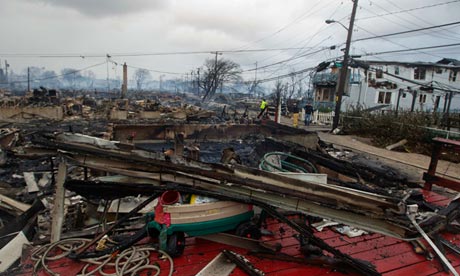
Wreckage and fire damage left by post-tropical cyclone Sandy in Queen’s, New York. Photograph: Shannon Stapleton/Reuters
It’s exceedingly common after tragic events for economists to claim that a natural disaster or act of terrorism is a benefit to an economy. With Hurricane Sandy on her way out, dozens of economists have taken to the press with their defunct ideas about how the hurricane’s devastation will be a “stimulus.” The natural disaster appears to have been contained to a loss of around $35-$45B with no exact reports yet of the full extent of the damage. But that hasn’t stopped the disciples of John Maynard Keynes from telling us that terrifying acts of destruction are good for us.
Such thinking is rampant amongst modern economists, even those generally considered to be advocates of a freer marketplace. Peter Morici this morning claimed that Hurricane Sandy will unleash “at least $15-$20 billion in new direct private spending — likely more as many folks rebuild larger than before, and the capital stock that emerges will prove more economically useful and productive.” He goes on to say: “consider a restaurant with inadequate patronage — its owner invests the insurance settlement in a new more attractive business. On the shore, older smaller homes on large plots are replaced by larger dwellings that can accommodate more families during the summer tourist season. The outer banks of North Carolina saw such gains several decades ago after rebuilding from a storm of similar scale.”
This sort of backwards thinking is unfortunately rampant in todays society. It is somewhat of a derivation of the philosophy of Friedrich Nietzsche, who was credited with saying “That which does not kill you makes you stronger.” However, this idea is incorrect on its face. There are many easy examples of situations and experiences that do not kill us, but leave us infinitely weaker in the wake of the events devastation. Although cancer is an obvious example, the events of 9/11 do not seem to have unleashed the tremendous economic benefit promised to us by the followers of Lord Keynes. Indeed the day after 9/11, Keynesian economics advocates such as Paul Krugman stated “The terror attack — like the original day of infamy, which brought an end to the Great Depression — could even do some economic good.” NYT 9/14/01
The economics of this is debunked however in a very easy to understand metaphor by French economist, Frederic Bastiat who called this type of thinking “The Broken Window Fallacy.” It goes like this. A small boy in a town breaks the window of a local bakery. Instead of being chastised for his act, the townspeople applaud him. Why? He has created a job for the glazier. The act of breaking the window was stimulative to the glaziers economy. However, like most modern day economists they are favoring that which is seen vs. that which is unseen. For instance, if the boy had not broken the bakers window, the baker would have been able to afford a new suit, instead of paying the glazier for a new window. The window would have remained intact and the economy of the town would have a window AND a new suit. For a more detailed explanation of this fallacy you can watch this video by the Atlas Institute: Disastrous Economic Fallacies
So what do you think? Are natural disasters, war and acts of terrorism good for the economy? If so why not start a war with Japan or another nation to get us out of the recession? Leave your comments below.
